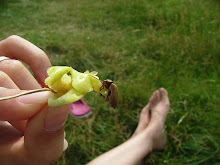My “Perfect” Student and Her “Helpful” Parents
Mimi is one of the eight-year-old girl students in my beginner class. She has always been pretty good in class. She pays attention and responds to my questions quickly. Every time when she hands in her homework, it's always perfect. However, about a week ago, I got a phone call from the father, and he asked to schedule a time to talk to me.
The day came when the father and I met. I was shocked to find that Mimi has been having problems doing her homework at home. It turned out that it was Mimi's mother who actually finished the homework (meaning she helped and checked all the mistakes) before Mimi came to class every single time. After that appointment with the father, I sat Mimi down one on one to see how much she could actually comprehend with the reading/writing assignments I had given the class. It was about 70% without my help, and 90% with my assistance. (I didn't tell her the answers, but only gave her hints.)
Due to the fact that the class was formed with beginners, I did not ask the students to memorize the spellings of new vocabulary, yet I trained them to recognize the words by using Phonics rules. I have checked Mimi's Phonics skills and she got only maybe 2 or 3 of them confused sometimes. She was able to point out the words I read to her, but obviously had more difficulty in read some longer vocabulary by herself. (eg. Water bottle, handkerchief, penguin…).
Before this event, I would grade Mimi's performance 90% perfect, but now, only 70%. I was rather upset—not with her, but with myself—for not having noticed her problem earlier.
Two important things I earned from this incident:
1. It is usually a great thing that the parents will remind/help their children to review after class. However, when the parents “fix all the problems” in the homework for the kids before class, they will leave no trace for the teachers to discover the students’ problems.
2. A good student in class can also be a problem student under the surface. As a result, checking the students’ progress by giving quizzes is necessary—even with young beginners who don't have to memorize the spellings yet.


0 Comments:
Post a Comment
<< Home